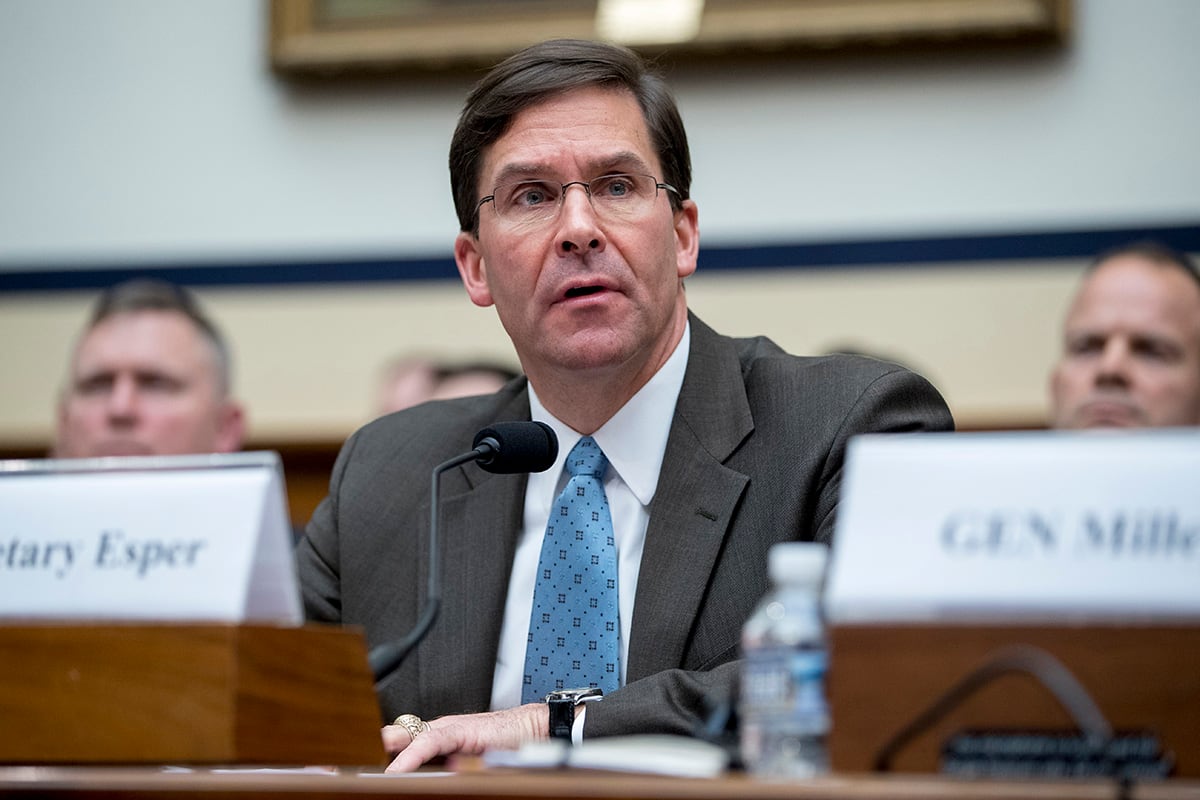Navy Secretary Richard Spencer strode into the defense secretary’s office at the Pentagon on Monday afternoon, in a symbolic changing of responsibility that will allow current Army Secretary Mark Esper to make his case to Congress for promotion to the Defense Department’s top job.
Esper, who has been serving as acting defense secretary since late June, stepped down Monday afternoon just after 3 p.m., once his nomination was formally received by the Senate. He is due in front of the Senate Armed Services Committee on Tuesday morning.
“We are committed to transparency throughout this process,” DoD chief of staff Eric Chewning told reporters. “The American people deserve to know there’s only one secretary of defense and that person is fully capable of defending the country and protecting our homeland.”
The move makes Spencer the third acting defense secretary on the books this year, after former Defense Secretary Jim Mattis’s December resignation upgraded then-Deputy Defense Secretary Patrick Shanahan. Shahanan withdrew his SECDEF nomination and stepped down from his Pentagon career in late June, after which Esper moved from Army secretary to acting SECDEF.
“While my time in this role is anticipated to be brief, I am fully prepared and committed to serve as acting secretary of defense, and I will provide continuity in the leadership of the department,” Spencer wrote in a memo to DoD personnel.
Esper, Spencer, acting Deputy Defense Secretary David Norquist, previously the Pentagon’s comptroller, and current Chairman of the Joint Chiefs of Staff Gen. Joseph Dunford met this morning to discuss the changeover, Chewning said.
“The senior team supporting the Office of the Secretary remains in place to ensure institutional continuity,” Pentagon spokesman Jonathan Hoffman.
RELATED

For the foreseeable future, Esper will return to the Army secretary’s office and conduct business as the civilian head of that service. He won’t have any of the powers of the SECDEF, Chewning said, but he could receive higher-level briefings if the holding period lasts longer than a few days.
“The answer looks differently if it’s a day or two or if it’s [longer],” he said.
Chewning declined to answer whether any high-impact decisions, such as troop deployments or other military action, have been or would be pushed off to wait for Esper’s confirmation.
If Esper is confirmed, Army Undersecretary Ryan McCarthy ― who is currently “performing the duties of the Army secretary” ― is expected to be nominated to replace him.
Spencer, meanwhile, will briefly go back to the Navy department, Chewning said, before returning to SECDEF’s office under the title of “performing the duties of the deputy defense secretary" when the Senate receives Norquist’s nomination for that role.
Meghann Myers is the Pentagon bureau chief at Military Times. She covers operations, policy, personnel, leadership and other issues affecting service members.





